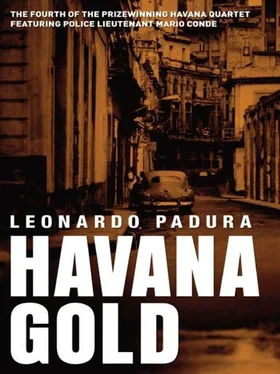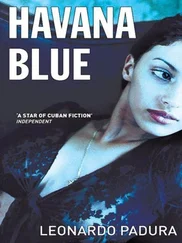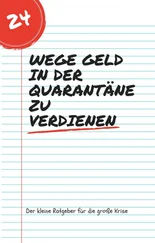And he got up wanting to give his friend a hug, but didn’t dare. There were hundreds and hundreds of things he never dared do.
Nobody can imagine what night-time is like for a policeman. Nobody can know what ghosts visit him, what hot flushes assail him, the hell where he simmers on a slow burner or where fierce flames shoot around him. The act of closing your eyes can be a cruel challenge, conjuring up troublesome figures from the past, who never leave your memory, who return, night after night, with the tireless regularity of a pendulum. Decisions, mistakes, acts of arrogance, even the frailties of generosity return like irredeemable sins to haunt a conscience marked by each petty act of infamy committed in the world of the infamous. José de la Caridad sometimes pays me a visit, that black truck driver who asked, begged me not to send him to jail because he was innocent, and I questioned him over four days, it just had to be him, it couldn’t be anyone else, as he collapsed and wept and repeated his innocence, until I put him behind bars to await a trial that found him innocent. Sometimes Estrellita Rivero returns, the girl I tried to hold back for a second before she took that fatal step and was shot between the eyes by Sergeant Mateo who’d meant to hit the legs of the man running away. Or Rafael and Tamara waltzing out of death or the past, as if it were twenty years ago, he in a suit and she in a long white dress, like the bride she was soon to be. Nothing is gentle in the night of a policeman, not even the memory of that last woman or the hope of the next, because each memory and each hope – that will one day be a memory – is tarnished by the daily horrors in his life: I met her while investigating the death of her husband, the frauds, lies, bribes, abuses and fears of that man who seemed perfect from the heights of his power; I’ll remember her, perhaps, because of someone’s murder, another’s rape or sorrow. A policeman’s nights are murky waters: they reek foul and bear the colour of death. To sleep!… Perchance to dream! And I have learned there is only one way to defeat them: lack of consciousness, dying a little every day, and every dawn is death itself, when what should be joyful sunshine is torture to the eyes. Horror at the past, fear of the future: that’s how a policeman’s nights rush towards daytime. To catch, question, imprison, judge, sentence, accuse, repress, persecute, pressurize and crush are the verbs which conjugate the memories and entire life of a policeman. I dream I could dream other happy dreams, build something, possess something, hand something on, receive and create something: write. But it’s the futile delirium of a man who feeds on what has been destroyed. That is why a policeman’s loneliness is the most fearful loneliness: it accompanies his ghosts, sorrows, guilt… If only a woman would play a lullaby on her saxophone to send this particular policeman to sleep. But, silence, only silence! Night has fallen. Outside an accursed wind ravages the earth.
The two analgesics weighed on his stomach like a great burden of guilt. Conde had swallowed them in a huge cup of black coffee, after noting that the remains of the last milk he’d purchased had become a pungent whey at the bottom of a litre bottle. Luckily he’d discovered he’d still two clean shirts in his wardrobe and had the luxury of choice: he voted for the white and brown striped option with long sleeves he rolled back to his elbow. His jeans – that had finished up under his bed – had endured a mere fortnight’s campaign and could resist another fifteen or twenty days. He tucked his pistol into his trouser waistband and felt he’d lost weight, though he decided it was no cause for worry: he wasn’t hungry, or cancerous, for heaven’s sake. Besides, apart from his stomach ache, everything was fine: he didn’t have bags under his eyes, his incipient baldness was hardly rampant, his liver was valiantly bearing up, his headache was fading and it was Thursday and tomorrow would be Friday, he counted on his fingers. He stepped into the sun and the wind and almost started leathering out an old love song.
More than a thousand years will pass, many more,
I don’t know if love is eternal,
but here as much as there…
He walked into headquarters at eight-fifteen, greeted various colleagues, enviously read the new 1989 statement on retirement on the noticeboard in the lobby and, smoking his fifth cigarette of the day, waited for the lift in order to report to the duty officer. He was cherishing the fond hope he wouldn’t be given a new case yet: he wanted to devote his intellect to a single idea, and, over the last few days he’d even felt a renewed desire to write. He’d re-read a couple of books that always got his grey cells working, and written down a few of the lines obsessing him in an old school notebook, on green-lined yellow paper, like a forgotten pitcher sent to warm his arm up before making the decisive throw. His meeting with Tamara, a few months ago, had disturbed past nostalgias, forgotten feelings and hatred he thought had disappeared and that now rushed back into his life summoned by that surprise re-encounter with a vital slice of his past he really must come to terms with, absorb or send packing once and for all. He was thinking how all that might contain material to weave a really moving story about the times when they were all very young, very poor and very happy: when Skinny was still skinny and Andrés was still set on being a baseball player, Dulcita had yet to go, Rabbit was all geared up to be a historian, naturally, Tamara had yet to marry Rafael and was so very beautiful, and even he dreamed more than ever he would be a writer and only a writer – while from his bed he contemplated the photo of old Hemingway on his wall and tried to catch the mystery behind the look in the writer’s eyes which lay bare the world and saw what other eyes never saw. He thought that if he ever wrote a chronicle of love, hatred, happiness and frustration, he would call it Havana Blue .
The lift stopped on the third floor and the Count turned right. The floors of headquarters were gleaming, recently swept with sawdust soaked in kerosene, and the sun shone through the high glass and aluminium windows to reveal the long corridor in all its newly awakened brightness. It was so clean and well-lit it really didn’t seem like a police headquarters. He pushed the double glass door and entered the room of the duty officer who was experiencing the most frantic moments in his day: officers handing in reports, detectives protesting about a court sentence, assistants in need of assistance and even Lieutenant Mario Conde, with a bolero perpetually on his lips: “From my life, I give you the best / I’m so poor what else have I to give…” and a cigarette between his fingers, who, as he approached the duty officer’s desk, that morning occupied by Lieutenant Fabricio whose comments he barely heard: “The major wants to see you. Don’t ask me what it’s about. I haven’t a clue and it’s hell here today, and you know you get your cases from the boss, because you’re his pretty boy for some reason or other.”
The Count glanced at Lieutenant Fabricio: he seemed really at sea among the paperwork, ringing telephones and shouting, and he realized his hands had started to sweat; it was the second time Fabricio had treated him like that and the Count told himself there was no way he was going to tolerate his stupid jibes. A few months ago, during the investigation of a series of thefts in various Havana hotels, Major Rangel had ordered the Count to take over the case from Fabricio. The Count had tried to refuse but couldn’t: the Boss had made his mind up. There was no putting him off and he had apologized to Lieutenant Fabricio, explaining that the decision wasn’t his. Several days later, when the Count caught the thieves and tried to tell Fabricio how the case had ended the latter retorted: “I’m so happy for you, Conde, I bet the Major will give you a kiss at the very least”. And he had looked for every possible excuse to forgive the lieutenant’s attitude. And in the end had forgiven him. But now a lingering awareness of his roots reminded him he’d been born in a barrio that was too hot and unruly, where you couldn’t lower the banner of manhood for a single moment, on pain of becoming bereft of banner, manhood, even of the flagpole itself: no, at his age he wasn’t going to brook that kind of response. He raised a finger, prepared to launch into a spiel, and then held back. He waited for a moment until the office was empty, rested his hands on the edge of the desk, lowered his head until it was level with Fabricio’s eyes and said: “Let me know if you’ve got an itch. I can scratch you when you want, where you want and how you want, do you get me?” And turned half round, and felt the daggers from the other man’s eyes stab his back. What the fuck’s wrong with the fellow…
Читать дальше











